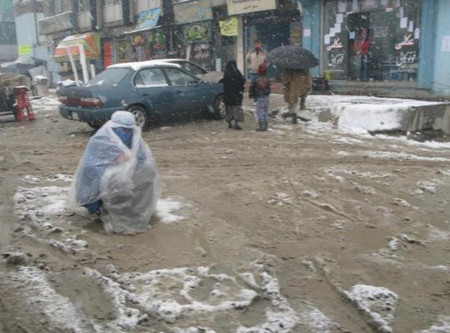Harsh winters are always a major cause for concern in Afghanistan. The country's geography and its unstable security situation pose a huge challenge to international organizations trying to assist vulnerable communities in remote villages.

Wearing a burqa and a plastic sheet, a woman begged on a Kabul street. Afghanistan remains one of the poorest countries, with high rates of unemployment, illiteracy, and infant mortality. (Pamela Constable/Washington Post)
When the temperature drops, it becomes difficult for people in remote areas to find food, with farmers unable to provide a solution in the harsh climatic conditions. Obe district in western Afghanistan, which lies 100 kilometres to the east of Herat, was flooded last winter and its communities are still vulnerable.
Providing hope
Mirza Agha Jan is just 12 years old. He is waiting in line to receive a relief package from the Red Crescent. Life hasn't been easy for this young boy who carries the burden of responsibility on his small shoulders. His father died almost a year ago and, as the eldest child, Mirza now plays an important role at home. He works as hard as an adult to support his family and no longer goes to school like other children his age.
"My daily task is to go to nearby mountains to collect firewood. I sell some and we keep some for our family to use," says Mirza.
"After my father died," he says through tears, "my mother had no choice. We have no land like others to work on and no money to spend, so my mother started going to villagers' houses to get food. Their small but helpful donation is vital for my family. Most of the time, I also accompany her because I am the oldest. I have three sisters and two brothers," he explains.
The relief package from the Afghanistan Red Crescent comprises a month's supply of rice, oil, sugar, beans and tea, as well as a tarpaulin, blankets, jerry cans and kitchen sets – a life-saver for Mirza and his family, and almost 6,000 others in Obe district.
Relief for the most vulnerable
The Italian Red Cross provided funds through the International Federation of Red Cross and Red Crescent Societies (IFRC) to assist almost 30,000 people in western Afghanistan including the provinces of Herat, Ghor and Badghis. Fifty-one villages in Obe district, Herat province, were selected as food distribution sites in western Afghanistan.
"The selection of the most needy people is very important for us, so following an agreement with elders and district representatives, the Afghanistan Red Crescent divided its teams into three groups and started surveying the area house by house," said Mirza Hussain, the Red Crescent project supervisor.
"We did our best to make sure that those who needed it most received relief, but there are many others who still need our help," he added. The last phase of the relief distribution process was completed in Badghis province in early December reaching 12,000 people. The Afghanistan Red Crescent is the only countrywide humanitarian organization which, through its activities and volunteers, is able to reach the remotest communities.
With the exception of public UN sources, reproduction or redistribution of the above text, in whole, part or in any form, requires the prior consent of the original source. The opinions expressed in the documents carried by this site are those of the authors and are not necessarily shared by UN OCHA or ReliefWeb.



